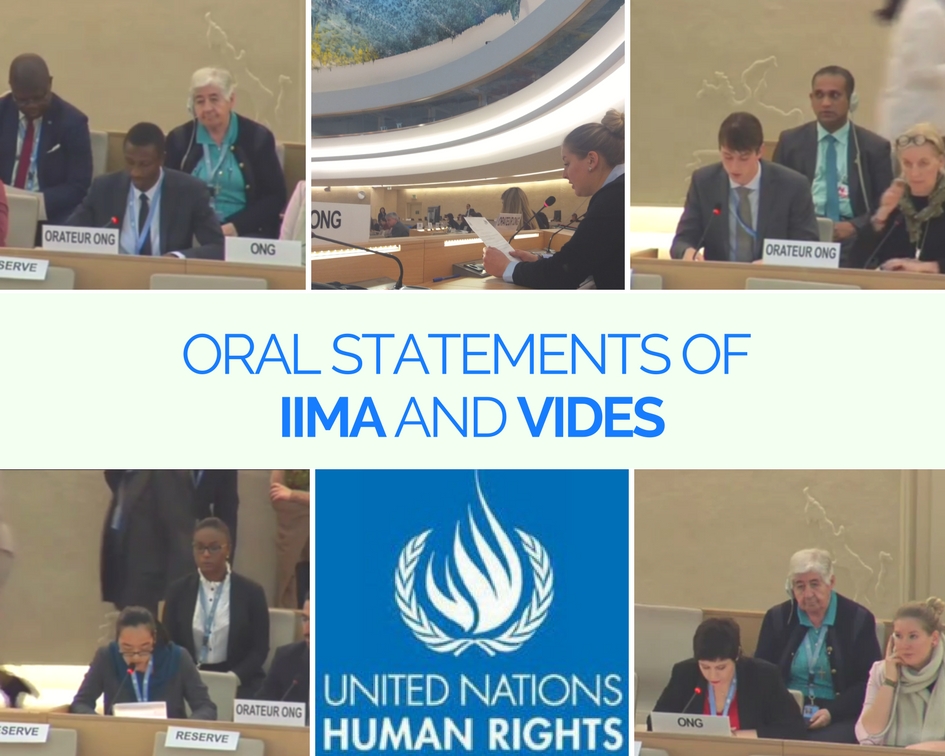
Oral Statements delivered by IIMA and VIDES during the 37th Session of the Human Rights Council
From February 26 to March 24, 2018, Istituto Internazionale Maria Ausiliatrice (IIMA) Human Rights Office and VIDES International contributed to the 37th Session of the UN Human Rights Council with ten oral statements regarding the rights of the child, rights of persons with disabilities, and interventions on the UPR outcomes of 7 countries where the FMA are present.
During the annual full-day meeting on the rights of the child, we expressed in our statement satisfaction for the choice of the theme: “Protecting the rights of the child in humanitarian situations”. Particularly, we stated our concerns about the plight of unaccompanied migrant minors who faced terrible human right violations during their perilous journey. We strongly called on the International Community to receive and protect unaccompanied minors all around the world.
On ITEM 3, to promote the rights of persons with disabilities, we asked the Special Rapporteur to adopt measures in order to raise awareness on the abilities and rights of persons with disabilities and combat stereotypes, negative attitudes and negligent practices against them in all areas of life.
During the annual debate on the rights of persons with disabilities we, IIMA and VIDES, stressed the importance of promoting active involvement and participation of persons with disabilities in the administration of justice on an equal basis with others so as to leave no one behind.
IIMA and VIDES contributed as well to the Universal Periodic Review outcomes of Argentina, Gabon, Peru, Guatemala, Republic of Korea, Benin, and Japan. We expressed satisfaction for the commitment of the countries mentioned above to promote the rights of children, young people, and women. However, to achieve the full implementation of the human rights of these vulnerable groups, we deemed it necessary to offer them some concrete recommendations.
In the case of Argentina, we recommended that the Government increase the minimum age for criminal responsibility according to the Convention on the Rights of a Child, as well as to ensure the fair trial of children and the due punishment for crimes against children.
With regard to Gabon, the recommendation of IIMA and VIDES aimed to address the youth unemployment issue so as to ensure their integration into the labor market, and thus reduce poverty in the country.
We stated in our recommendations to the government of Peru to continue its efforts to identify, in consultation with indigenous communities, special measures that will guarantee rights to healthcare and education particularly through the development of an inclusive-intercultural curriculum.
Likewise, VIDES and IIMA, underlined in their recommendation to Guatemala to improve its educational system so as to guarantee equal access to education for all, thereby eliminating the discrimination against indigenous children and the gender inequality issue in education.
Japan’s highly competitive education system is one of the major causes of stress and anxiety among students. For this, we deemed it important to recommend to its government to promote the students’ creativity, freedom, and individual talents.
In the case of Benin, we are asking its government to establish a national reporting mechanism and to continue its efforts to reintegrate in the society those children considered as “witches”.
IIMA and VIDES recommended to the Republic of Korea to ensure that all children have access to registration immediately after birth regardless of the status of their parents (citizens, migrant workers, refugees).
Through these oral statements, we had hoped to give a voice to the voiceless and to highlight concrete experiences from the ground.
To access Oral Statement videos and/or texts, click the link below: http://www.iimageneva.org/statements/

